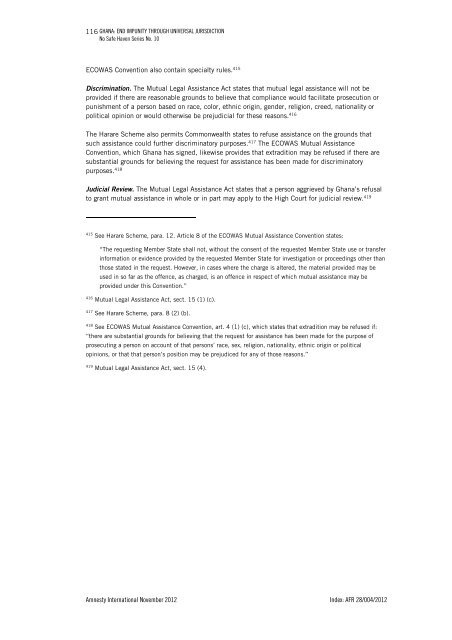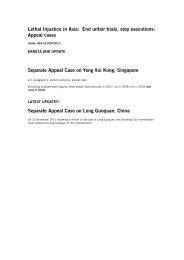116 GHANA: END IMPUNITY THROUGH UNIVERSAL JURISDICTIONNo Safe Haven Series No. 10ECOWAS Convention also contain specialty rules. 415Discrimination. The Mutual Legal Assistance Act states that mutual legal assistance will not beprovided if there are reasonable grounds to believe that compliance would facilitate prosecution orpunishment of a person based on race, color, ethnic origin, gender, religion, creed, nationality orpolitical opinion or would otherwise be prejudicial for these reasons. 416The Harare Scheme also permits Commonwealth states to refuse assistance on the grounds thatsuch assistance could further discriminatory purposes. 417 The ECOWAS Mutual AssistanceConvention, which <strong>Ghana</strong> has signed, likewise provides that extradition may be refused if there aresubstantial grounds for believing the request for assistance has been made for discriminatorypurposes. 418Judicial Review. The Mutual Legal Assistance Act states that a person aggrieved by <strong>Ghana</strong>’s refusalto grant mutual assistance in whole or in part may apply to the High Court for judicial review. 419415See Harare Scheme, para. 12. Article 8 of the ECOWAS Mutual Assistance Convention states:“The requesting Member State shall not, without the consent of the requested Member State use or transferinformation or evidence provided by the requested Member State for investigation or proceedings other thanthose stated in the request. However, in cases where the charge is altered, the material provided may beused in so far as the offence, as charged, is an offence in respect of which mutual assistance may beprovided under this Convention.”416Mutual Legal Assistance Act, sect. 15 (1) (c).417See Harare Scheme, para. 8 (2) (b).418See ECOWAS Mutual Assistance Convention, art. 4 (1) (c), which states that extradition may be refused if:“there are substantial grounds for believing that the request for assistance has been made for the purpose ofprosecuting a person on account of that persons’ race, sex, religion, nationality, ethnic origin or politicalopinions, or that that person’s position may be prejudiced for any of those reasons.”419Mutual Legal Assistance Act, sect. 15 (4).<strong>Amnesty</strong> <strong>International</strong> November 2012 Index: AFR 28/004/2012
GHANA: END IMPUNITY THROUGH UNIVERSAL JURISDICTIONNo Safe Haven Series No. 101178. SPECIAL IMMIGRATION, POLICE ANDPROSECUTOR UNITSSpecial immigration units. <strong>Ghana</strong> does not have a special immigration unit designed to screenpersons suspected of crimes under international law. Such a unit would have a mandate not only toexclude such persons from travel (either when seeking a visa abroad or when arriving at the border),but also to refer their files to police or prosecuting authorities for investigation and, where there issufficient admissible evidence, prosecution. 420 In practice, some screening is conducted by the<strong>Ghana</strong> Police and immigration officers in the <strong>Ghana</strong> Immigration Service. 421 However, noinformation could be obtained from officials documenting the procedures or methods used by thesetwo agencies to screen persons suspected of such crimes or about what steps were taken whenpersons suspected of such crimes applied for a visa abroad or were stopped at the border. Forexample, although authorities indicate that immigration officials may inform the police or make anarrest on their own initiative, 422 it is not known whether police or immigration officials arrestsuspected perpetrators with a view to exclusion, deportation or referral to prosecutors for the purposeof determining whether they should be prosecuted.Special police units. <strong>Ghana</strong> does not have a special police unit, or a joint police and prosecutionunit, with a mandate to investigate and prosecute crimes under international law. However, <strong>Ghana</strong>has established an Anti-Trafficking Unit, a Virtual Crime Analysis Unit and a Commercial CrimeUnit, all of which investigate crimes under national law of international concern (such as humantrafficking, cross-border financial crime and cyber crime) and a Domestic Violence and VictimSupport Unit of the police, which handles domestic and gender-based crimes.Special prosecution units. <strong>Ghana</strong> does not have a special prosecution unit, or a special police andprosecution unit, with a mandate to investigate and prosecute crimes under international law.However, <strong>Ghana</strong> has established an Economic and Organized Crime Office (EOCO), which prosecutesfraud and corruption.420A Refugee Board under the Ministry of Interior performs some of these functions, but only for those seekingasylum. See Refugee Act, 1992 (P.N.D.C.L. 305).421Interview with Assistant Commissioner of Police and Director of Operations, <strong>Ghana</strong> Police Service CriminalInvestigation Department, in Accra, <strong>Ghana</strong> (28 June 2012); Interview with Chief State Attorney, Ministry ofJustice Office of <strong>International</strong> Cooperation, in Accra, <strong>Ghana</strong> (27 June 2012).422Interview with Assistant Commissioner of Police and Director of Operations, <strong>Ghana</strong> Police Service CriminalInvestigation Department, in Accra, <strong>Ghana</strong> (28 June 2012).Index: AFR 28/004/2012 <strong>Amnesty</strong> <strong>International</strong> November 2012
















